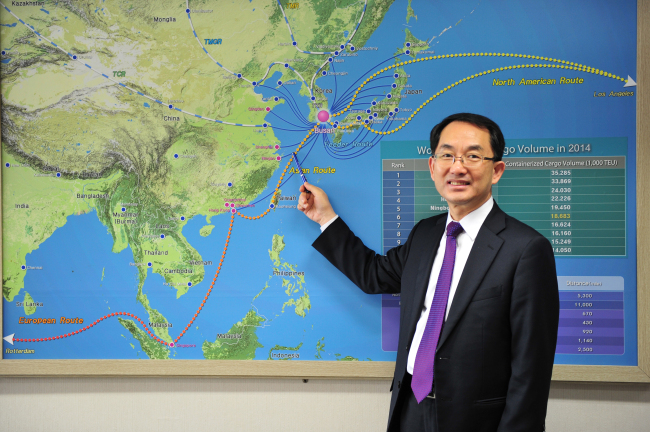Once a wasteland, the Busan-Jinhae Free Economic Zone in South Gyeongsang Province is now closer to its goal of becoming a global business and logistics hub, a top official said.
With a land area of 51.2 square kilometers, Busan-Jinhae FEZ is a specially designated region to attract foreign investment in order to strengthen competition for businesses by supporting regional development and improving the business environment as well as living conditions.
 |
Busan-Jinhae FEZ Commissioner Jin Yang-hyun speaks during an interview with The Korea Herald. BJFEZ |
Designated as one of eight Korean free economic zones, the Busan-Jinhae area quickly developed to become a business center, Busan-Jinhae FEZ Commissioner Jin Yang-hyun told The Korea Herald.
The development of the region is mostly attributed to its strategic location, he said.
“The Busan-Jinhae Free Economic Zone is desirably located in the center of Northeast Asia, connecting the Pacific Ocean and Eurasia, which in turn connects all three regions,” he said.
Busan New Port, one of the five major projects for the development of the economic zone, clearly highlights how the Busan-Jinhae FEZ successfully connects all three regions. Opened in 2010, the port currently handles more than two-thirds of the cargo transported in Busan, which is Korea’s largest logistics hub, handling the world’s sixth-largest cargo volume as it connects major ports in Japan, China and Russia.
The five major projects for the development of the economic zone are part of the Busan-Jinhae FEZ overall “3+1 core values” plan that focuses on creating the region into an international logistics center, fostering a global business environment and creating a tourism and leisure district while upgrading the existing businesses.
Other major projects that will expand the region’s reputation as a global business hub include Myeongji International City, Udong district, Jisa district and Dudong district, according to the BJFEZ chief.
The creation of the new Myeongji International City is one prime example of making Busan-Jinhae FEZ an international hub, as the city will strive to become the center of international business with advanced IT-based complexes and convention centers. Furthermore, foreigner-friendly facilities such as international schools and health care facilities for foreigners are under construction.
As of this month, 87 percent of the city construction is under progress, which required 2 trillion won ($1.7 billion) in investment.
By the end of this year, the first stage of the international city’s construction will be finished, and by the end of next year, 20,000 households will move into the city.
The remaining three projects will develop the region’s tourism and technology.
The Undong district will become the center of leisure and tourism as it will have various leisure facilities including golf courses and outlets.
The Jisa region and the Dudong region will become research and development centers as they will house university campuses and company facilities so that existing industrial complexes such as manufacturing and shipbuilding facilities can be upgraded by integrating cutting-edge technology such as the Internet of Things.
Amid the global recession and troubled shipbuilding industry, Busan-Jinhae FEZ is currently striving to attract foreign direct investment amounting to $130 million by the end of this year.
The Busan-Jinhae FEZ Authority already offers various incentive packages including tax reduction and financial support to foreign investment companies.
To be eligible for tax reduction, foreign investment companies must invest over $10 million in tourism, $5 million in port logistics, or $1 million in research and development.
In an effort to attract more investment, Busan City and Shinhan Bank, the flagship bank of Korea’s leading banking unit Shinhan Group, recently signed an agreement to exchange information and know-how to attract foreign investment.
Moreover, the Busan-Jinhae Free Economic Zone Authority already succeeded in signing agreements on cooperation with foreign companies, such as a memorandum of understanding with Japanese sports apparel brand Descente worth 35 billion won to create a shoe research center.
“The Busan-Jinhae FEZ Authority will additionally continue to enhance investor relations and will focus on attracting investment from China later on this year,” Jin said.
By Lee Seo-young (
seoyounglee@heraldcorp.com) and Yoon Jung-hee (
cgnhee@heraldcorp.com)








